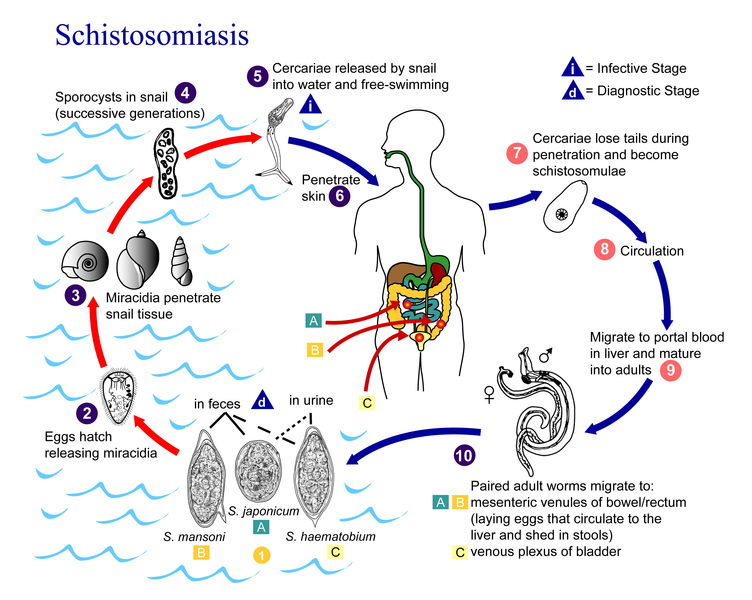Fichier:Schistosomiasis Life Cycle.png
Apparence

Taille de cet aperçu : 752 × 600 pixels. Autres résolutions : 301 × 240 pixels | 602 × 480 pixels | 963 × 768 pixels | 1 280 × 1 021 pixels | 2 560 × 2 042 pixels | 2 936 × 2 342 pixels.
Fichier d’origine (2 936 × 2 342 pixels, taille du fichier : 1,94 Mio, type MIME : image/png)
Historique du fichier
Cliquer sur une date et heure pour voir le fichier tel qu'il était à ce moment-là.
| Date et heure | Vignette | Dimensions | Utilisateur | Commentaire | |
|---|---|---|---|---|---|
| actuel | 21 septembre 2010 à 22:05 |  | 2 936 × 2 342 (1,94 Mio) | Leyo | {{Information |Description={{en|Eggs are eliminated with feces or urine (1). Under optimal conditions the eggs hatch and release miracidia (2), which swim and penetrate specific snail intermediate hosts (3). The stages in the snail include 2 generations o |
Utilisation du fichier
Les 2 pages suivantes utilisent ce fichier :
Usage global du fichier
Les autres wikis suivants utilisent ce fichier :
- Utilisation sur ar.wikipedia.org
- Utilisation sur arz.wikipedia.org
- Utilisation sur ceb.wikipedia.org
- Utilisation sur cs.wikipedia.org
- Utilisation sur de.wikibooks.org
- Utilisation sur en.wikipedia.org
- Utilisation sur es.wikipedia.org
- Utilisation sur hu.wikipedia.org
- Utilisation sur hu.wikibooks.org
- Utilisation sur ml.wikipedia.org
- Utilisation sur nl.wikipedia.org
- Utilisation sur pl.wikipedia.org
- Utilisation sur sv.wikipedia.org
- Utilisation sur uz.wikipedia.org
- Utilisation sur vi.wikipedia.org


